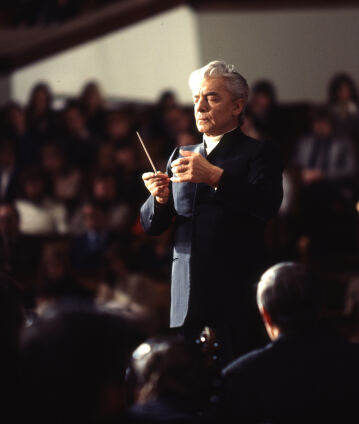Director of the perfect sound: Herbert von Karajan with the Berliner Philharmoniker

As chief conductor of the Berliner Philharmoniker, Herbert von Karajan shaped an era that began in 1955 and ended only a few months before his death in July 1989. Among its highlights were the founding of the Salzburg Easter Festival, the opening of the Philharmonie designed by Hans Scharoun, and many audio and visual recordings. Our playlist of great works from the 19th and 20th centuries lets you experience Karajan as the director of his ideal orchestral sound.
In his 34 years as chief conductor of the Berliner Philharmoniker, Herbert von Karajan preserved the tradition of his great predecessors Hans von Bülow, Arthur Nikisch and Wilhelm Furtwängler, while at the same time leading the orchestra into a new age increasingly influenced by technical innovations. On many tours and with innumerable records, CDs and film recordings sold, the conductor and his orchestra reached an audience of millions all over the world. Karajan, who had learned his trade at the small opera houses in Ulm and Aachen, was famous for his tonal perfectionism and masterful command of a huge repertoire ranging from the Baroque to Modernism.
Among the conductor’s favourite composers were Beethoven, Wagner and Richard Strauss. He recorded Beethoven’s symphonies in their entirety with the Philharmoniker no less than three times, Strauss’s tone poems were showpieces of his repertoire, and the Salzburg Easter Festival founded by Karajan in 1967 allowed for the staging of Wagner operas. In addition to works by these three composers, our playlist also includes performances of Czech, Russian and French music. The 2nd Suite from Ravel’s ballet Daphnis et Chloé included in this selection, was conducted by Herbert von Karajan at his debut with the Philharmoniker in 1938.